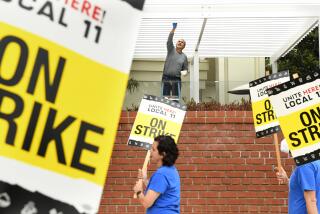Complaint accuses luxury Terranea Resort of human trafficking violations, exploiting foreign interns
Foreign exchange interns Falak Rashid and her fiancé Wahid Rahman couldn’t wait to start their year in Southern California.
Terranea Resort billed itself as a 102-acre Palos Verdes luxury retreat, mere minutes from the bustle of Los Angeles. The couple, part of a culinary internship program, would rotate among the resort’s eight restaurants and learn to prepare cuisines from around the world, becoming chefs capable of opening an international restaurant back in their native India.
Instead, Rashid, 23, and Rahman, 24, who spent a combined $15,000 on airfare, U.S. visas and placement fees, said they were put to work as entry level cooks in one of the resort’s kitchens, where they received no meaningful training, and under exploitative conditions.
The couple stayed less than two months before deciding to cut their losses and fly back to Kolkata. They had blown through their savings and accumulated $11,000 in debt.
Last week, Unite Here Local 11, which represents hotel workers in Southern California, filed a complaint with the U.S. State Department on behalf of Rashid and Rahman.
The complaint alleges the resort “replaced nearly its entire entry-level cook workforce” with interns from Asian countries including the Philippines, Malaysia and India, employing about 45 such workers across its various kitchens by 2017.

Unite Here asserts that the resort misled interns and violated the State Department’s regulations for the J-1 cultural and educational exchange visa, as well as human trafficking and labor laws. The union seeks reimbursement of the couple’s expenses and an investigation of Terranea’s internship program.
Filling positions with interns violates the visa program’s mandate against displacing American workers, according to the complaint. The interns perform essentially the same routine tasks as ordinary workers but pay large placement fees and don’t receive raises or benefits.
“The workers are vulnerable to exploitation because their immigration status in the U.S. is tied to their continued employment at the resort,” the complaint states. Advocates said many workers are afraid to speak out because they’ve spent so much money and they need the certificate of completion for their resume.
Jessie Burns, a spokeswoman for the resort, called the allegations baseless. She said Terranea has offered culinary internships through the visa program since 2011. More than 160 students have completed the yearlong program, she said.
“We are very proud of the students who we have trained and who have gone on to launch their own culinary journey,” she said in an email. “Some of our interns have successfully opened their own restaurants, and become sous chefs and chefs at other resorts.”
Rashid and Rahman had recently graduated from culinary school and were looking for more hands-on experience before starting their careers. A visa sponsor organization, International Educational Exchange, recommended Terranea.
The $480 million resort property is owned by the Los Angeles-based Lowe Enterprises and employs 1,200 people. The resort has nearly 600 rooms, four ocean-view pools, a spa and a nine-hole golf course.
During a Skype interview, managers described the program as a valuable opportunity in which interns would learn about all the resort’s operations and a variety of cuisines. The couple was selected for the program, which was set to begin August 15.
Their problems started as soon as the plane touched down in Los Angeles.
Rashid and Rahman said they had been told they would receive help finding a place to live. They ended up staying in a hotel for two nights before finding a room in a crowded two-bedroom apartment with four other Terranea employees.
Burns said interns are provided information on temporary housing options in the area and outgoing interns, as well as the coordinating agency, often help incoming interns get settled.
The couple’s internship placement plans, which are signed by an International Educational Exchange representative and by two Terranea managers, specify that the interns would receive “on-site supervision and mentoring” through structured activities such as classroom training, seminars and department rotations.
The plans said Rashid and Rahman would rotate in phases from kitchen prep, to meat and seafood, to sauces. They were promised cultural activities like a New Year’s gala and visits to amusement parks.
Terranea’s managers assured that the trainees would receive daily feedback and that supervisors would address their questions and concerns. Their signatures certified that the interns would not fill a labor need.
On her first day of work, making $14.50 an hour, Rashid said she was told to watch a 30-minute video on knife safety and read a book of safety procedures and a summary of recipes. Then, she was immediately put to work in the kitchen responsible for room service meals.
A fellow intern showed Rashid how to make flatbreads then left her on her own. He said she’d have to learn quickly because she would be in charge of opening and closing the kitchen by her second week.
“I’m here to learn,” she recalled saying to him. “You can’t leave an intern in charge of these things alone.”
The couple said their jobs consisted of cleaning, chopping vegetables and making sandwiches, burgers, salads and pizzas. They said they were berated by the chef on several occasions. They also had to purchase their own knives, thermometers and shoes.
The Unite Here complaint says Terranea’s conduct appears to violate the federal Trafficking Victims Protection Reauthorization Act, which prohibits fraudulently recruiting or hiring a person outside of the U.S. for employment in the U.S. under false pretenses.
“This is not a typical trafficking case,” said attorney Jeremy Blasi, “but there are elements of the law that are meant to protect workers from this kind of abuse.”
Lead cook Freddy Lovato, 45, said he noticed when interns began filling full-time entry-level cook positions. Now, he estimates that interns fill at least 60% of those positions overall.
Lovato works in the room service kitchen, where he met Rashid and Rahman. He has 20 years cooking experience and has been with Terranea since it opened in 2009.
He said the interns’ lack of experience and training can make his job more difficult, especially because they leave just as they’re getting better. “We train them fast because we also have our own duties,” he said.
Fed up, Rashid and Rahman decided to leave. They emailed their sponsor organization and flew home on Oct. 2.
Now, Rahman works for a wedding planning company making $500 a month. He recently sold his Honda to make a loan payment.
“I wanted to learn about the cuisine, the culture, the way of hospitality there and the way of cooking” he said. “But we were stuck in one place where we were only told to make pizza, flatbreads, salads and sandwiches.”
This isn’t the first complaint against Terranea. Workers sued the hotel in October, over a wage dispute and allegations that they were denied meal and rest breaks.
The lawsuit asserts that Terranea also doesn’t reimburse some kitchen employees for cooking equipment. If approved by the court, the complaint could become a class-action suit, representing about 600 employees at the resort.
Terranea was the subject of a class-action lawsuit in 2011 that contended the resort wasn’t paying overtime wages and minimum wages as required by law. The suit was settled with the resort agreeing to pay $1.1 million to the workers and to cover attorney fees.
Jon Tuason, 30, participated in the internship at Terranea in 2015 after the company recruited students at his culinary school in the Philippines. Tuason is a U.S. citizen but grew up in the Philippines.
Like Rashid and Rahman, Tuason and two other interns arrived with no idea how to get to the resort or find housing. His first days at work consisted of filling small jars with oil.
“I felt like a manufacturing machine,” he said. “I knew it was going to be hard work — I was expecting that. But I was at least expecting to learn something from it.”
Tuason said he stayed in the room service kitchen for about five months before he was allowed to transfer to the cold kitchen, where he made salads and peeled fruit for the remainder of his internship.
Toward the end of his year at Terranea, Tuason sensed he would never receive the structured learning he had signed up for. He decided to ride it out, figuring he wouldn’t get his money back and feeling too intimidated to complain. He now works at Bottega Louie in downtown Los Angeles in guest services.
Before he left, Tuason said Terranea managers asked him to be part of a video presentation they would use to recruit more interns from the Philippines. He smiled for the camera and talked about how fun it is to live and work in the Golden State.
“That line gets interns excited,” he said. “The feeling that they’re in California — it’s what drives them here. But at the end of the day, we’re here to help Terranea save money.”
More to Read
Start your day right
Sign up for Essential California for news, features and recommendations from the L.A. Times and beyond in your inbox six days a week.
You may occasionally receive promotional content from the Los Angeles Times.






